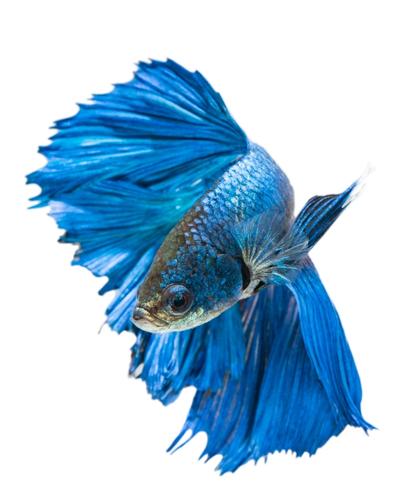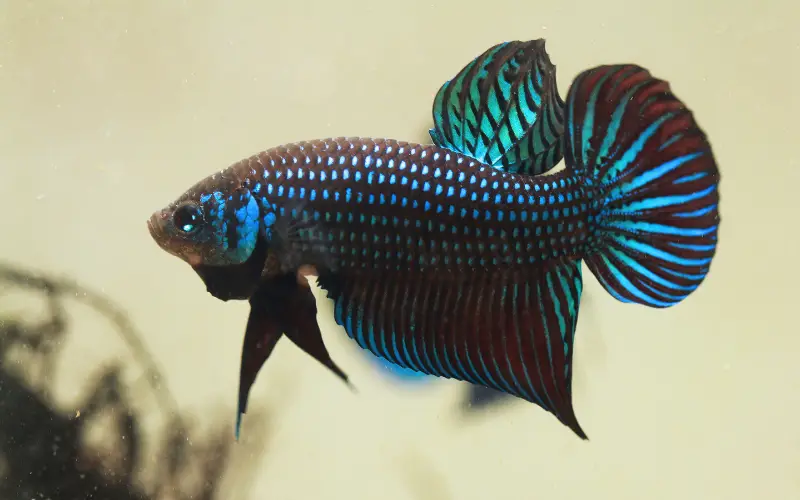What causes stress in a betta fish? Betta fish, often referred to as Siamese fighting fish, are admired for their vibrant colors and graceful movements. But even these beautiful creatures are not immune to stress. If you’ve been wondering how to tell if betta is stressed, paying attention to their behavior and appearance is key.
Stressed bettas exhibit clamped fins, rapid gill movement, loss of appetite, lethargy, hiding, and changes in color. Finn nipping or aggression can also indicate stress.
Stress in bettas can be triggered by various factors, such as poor water quality, overcrowding, or sudden environmental changes. Left unchecked, it can impact their health and overall well-being. By recognizing the betta stress signs early, you can take steps to ensure your betta thrives in its aquatic home.
When a betta fish feels stressed or frightened, it often shows visible signs. Male bettas, in particular, may lose their brilliant coloration, appearing dull or faded.
Their fins might look ragged, and they could start hiding constantly, avoiding interaction or activity. These are red flags that your fish isn’t feeling its best.

Identifying these symptoms quickly allows you to address the underlying issues, helping your betta return to its lively, colorful self. Keep reading to discover the common causes of betta stress and actionable tips to create a stress-free environment for your aquatic friend!
In this definitive blog post, we will be exploring ten common betta fish stress signs indicating when a betta fish may be overly stressed or unhappy so you can ensure they are as comfortable as possible in their habitat!
Keep reading if you want to learn how to tell if your betta is stressed and identify potential hazards before they even occur.
Table of Contents
ToggleIs My Betta Fish Stressed or Happy?
How to know if betta is stressed? Nothing compares to the joy of watching a healthy and content betta swim about in their tank. From gentle meandering around the edges to quick flitting from one side to another, bettas are an absolute delight!
Betas are naturally energetic and active swimmers, exhibiting various swimming behaviors throughout the day.
When stressed betta fish swimming around their small tank unhurriedly or quickly dart from one side to another – it’s usually a good sign that your aquatic friend is healthy and content!
Keep your eyes peeled for any signs of betta stress that they may be struggling or not feeling well – if all appears clear, then you know it’s happy as can be.
How to Tell If Betta Is Stressed?
How to know if betta fish is stressed? Bettas, also known as Siamese fighting fish, are common aquarium pets with various vibrant colors and captivating fins.
How do i know if my betta is stressed? Despite their beautiful appearance, Bettas can become easily stressed due to environmental changes or aggressive behavior from other fish species or fish keepers.
What Are Common Betta Fish Signs of Stress?
What are signs your betta is stressed? As a result, recognizing the signs of stress in betta fish is essential for all betta fish keepers.
Signs that your betta might be stressed include:
1) Rapid respiration: If your betta is panting quickly, it can indicate they are anxious or uncomfortable. This is especially true if they’re breathing at a rate much faster than usual.
2) Clamped fins: Clamping occurs when your betta tucks its fins close to its body instead of extending them outward like usual; this indicates some level of anxiety or fear in the fish.
3) Lack of appetite: Your betta may decline food offers if it’s feeling particularly unnerved by something around it, such as an unfamiliar object in the tank. Pay attention to whether he’s eating less than he typically does so you can take steps toward eliminating any sources of stress for him.
4) Color changes & patches on body/fins: Stressful situations can cause discoloration and pale patches on fin tips or darkening on the head due to melanin secretion (called “black spot disease”). Be sure to check up on him regularly to observe any sudden color changes that could indicate potential worries with his environment, health status, etc.
5) Hiding away often: Bettas love resting and loafing near plants and structures within the tank, but if you notice he is hiding away more often than usual, it could signify discomfort with his current state (i.e., poor water quality, temperature fluctuations).
Make sure things are of good quality within his habitat, including efficient filtration system & aeration units and daily cleanliness measures; these all contribute largely towards ensuring positive mental well-being for your pet!
In conclusion, many indicators help identify whether or not your Betta has been affected by a stressful situation.
It would be best if you always gave extra special care when introducing new animals into existing habitats, along with regular water testing & maintenance.
Protocols being strictly adhered to; will allow room for growth & development while minimizing risk factors associated with fishkeeping!
what causes stress in a betta fish?
Betta fish, known for their vibrant colors and energetic personalities, can also be quite sensitive to stress. Several factors can contribute to their stress levels, impacting their health and well-being. Here are some of the most common culprits:
Poor water quality:
- High levels of ammonia, nitrite, or nitrate: These are toxic waste products from fish waste and uneaten food and can irritate gills and impair breathing.
- Low oxygen levels: Bettas need well-oxygenated water, and stagnant tanks or overcrowding can deplete oxygen levels, causing stress and gasping behavior.
- Improper pH or temperature: Sudden changes or extremes in pH (acidity/alkalinity) or temperature can be very stressful for bettas. Aim for a stable pH between 6.8 and 7.5 and a temperature between 78°F and 82°F.
Tank environment:
- Small tank size: Bettas need space to swim and explore. While the minimum recommended tank size is 5 gallons, ideally, aim for 10 gallons or more to provide enrichment and prevent boredom.
- Lack of hiding places: Bettas appreciate having plants, decorations, or caves to hide in when they feel threatened or want to relax.
- Incompatible tank mates: Some fish can be aggressive towards bettas or vice versa, leading to constant stress and fin nipping. Research compatible tank mates if you plan on a community tank.
- Overcrowding: Too many fish in a tank can compete for resources like food and space, creating a stressful environment for all inhabitants.
Other factors:
- Loud noises or constant disturbance: Bettas can be startled by loud noises or frequent tapping on the tank glass. Create a calm and peaceful environment for your fish.
- Flashing lights or sudden changes in lighting: Abrupt changes in lighting can be stressful, so maintain a consistent day/night cycle.
- Improper diet: A low-quality diet or one lacking variety can lead to nutritional deficiencies and stress. Feed your betta a balanced diet of high-quality pellets, frozen bloodworms, or brine shrimp.
- Injury or illness: Any physical discomfort or illness can be stressful for your betta. Monitor your fish for signs of illness and address them promptly.
By understanding these common causes of stress, you can create a healthy and enriching environment for your betta fish, helping them thrive and live a happy life. Remember, a stressed betta is more susceptible to illness, so proactive care is vital!
What Does an Unhappy Betta Look Like?
How to tell if your betta fish is unhappy? Before and after stressed betta fish changes, one of the tell-tale signs that your betta is unhappy is a loss of appetite. A sick betta will not eat or will eat very little, if anything at all.
In addition, an unhappy betta fish may exhibit other signs of a stressed betta fish, such as clamped fins and rapid respiration.
Clamping occurs when the betta tucks its fins close to its body instead of extending them outward like usual. Rapid respiration is when the fish pants quickly, much faster than average.

Color changes and pale patches on fin tips or darkening on the head due to melanin secretion (“black spot disease”) are also common signs that your betta fish is stressed.
Finally, a stressed betta fish may also hide away more often than usual in the corner or back of the tank. This is a sign that your betta is feeling uncomfortable or threatened in its environment.
It’s important to monitor betta fish stress signs to ensure it is happy and healthy. If you notice any signs of stress, it’s essential to eliminate the source of stress and provide your betta with a comfortable and safe environment.
How to Tell If Betta Is Happy?
Bettas are one of the most popular fish kept as pets, but it can be hard to tell if they’re happy.
Many people mistakenly think that if a betta is swimming around their tank, it must be happy. However, this is only sometimes the case. Bettas can become stressed in certain situations and start swimming erratically or hide in plants or caves.
In this video, we provide four tips on how to tell if your betta is happy. We cover everything from watching their behavior to looking at their fins to seeing how they eat. If you need help telling whether your betta is content, this video is for you!
Remember: An aquatic paradise is a dream for all fish – and one your finned friend deserves!
Stress can take a significant toll on our gilled pals, so maintaining good water quality by replicating their natural habitat will help keep them healthy and content. From fin rot, and Ich to Swim Bladder Disease, creating an optimal home environment reduces the risk of affliction.
The 10 Happy Betta Fish Signs
It can be tough to tell if your betta fish is happy.
A lot of people think that if their betta fish isn’t swimming around like crazy, then they must not be happy. This isn’t the case; a betta fish resting may be quite content!
Here are 10 signs that your betta fish is happy!
1) Eating with gusto: A healthy betta should have a good appetite and enjoy his food! If you notice him quickly darting around the tank and aggressively eating his meals, this is an excellent sign that he’s happy!
2) Active swimming: Bettas tend to be more active in tank environments betta fish feel comfortable in. If you notice him swimming around more often and exploring his tank, this is a good sign that he’s content with his environment.
3) Bright coloration: When a betta feels excellent, it will show off its vibrant colors! Keeping an eye on how vibrant his fins & scales are could give insight into how he’s feeling inside the aquarium!
4) Vibrant fins: Besides bright coloring, healthy bettas also possess strong finnage, which should not look tattered or torn. Keeping tabs on how “fluffy” your Betta’s fins appear can help determine if he’s feeling happy & relaxed.
5) Social behavior: Happy Bettas often exhibit social behaviors like swimming up to the front of their tank when you approach, begging for food, or interacting with other fish species in their community tank (if applicable).
6) Belly-up pose: A betta that is content will sometimes bettas swim freely upside down close to the surface of the water. This behavior is known as “the belly-up pose” and is a sign that your Betta feels secure & comfortable in his environment!
7) Regular bottom resting: When a Betta feels safe & satisfied, it will rest on the bottom of its tank more often than usual. If you notice your fish spending more time at the bottom of its aquarium, this is an excellent sign that it is content with its environment.
8) Reduced sleeping: A healthy betta should spend most of his daylight hours swimming around his tank or interacting with other tankmates (if applicable). If you notice him sleeping less often during the day and being more active, this could indicate that he’s feeling good!
9) Building bubble nests: One of the most common signs of a happy betta is when they start to build “bubble nests” at the surface of their tanks. These nests are made out of bubbles produced by the Betta himself and can show how content & relaxed he is feeling in his environment.
10) Relaxed body: Finally, one of the most telling signs that your Betta is content and relaxed is his overall relaxed body posture. A happy betta will often have fins slightly leaning back and not showing any signs of distress or discomfort!
If you notice any of these ten signs in your betta, you can safely assume it is happy and thriving in its environment.
It’s crucial to keep an eye on your betta’s behavior, so you can make sure it has a safe and comfortable home! Remember, the key to a healthy & happy fish is providing them with the best care!
Can Bettas Recover from Stress?
Yes, bettas can recover from stress and become happy again! The key to helping your betta recover is ensuring an appropriate environment.
You are providing your fish with the right tank size and temperature and enough oxygen and plants. So add aquatic plants to the tank, as they can provide hiding spots and shelter for the fish.
Without a heater, the water temperature for Betta fish can quickly dip to levels that will sap their energy and leave them vulnerable to illness. Consider investing in an at-home aquarium immune system to ensure your sleek-swimming friend stays healthy.
Additionally, providing consistent feeding times and quality betta food will help your betta stay healthy. Finally, avoiding overcrowding and not over-clean the tank can ensure that your betta stays relaxed.
With the proper betta fish care, your betta can recover from stress and live a long, happy, stress-free life!
how to calm a stressed betta fish?
How Do You Calm a Stressed Betta Fish? Fish are known to be very calming and soothing pets, but it could be challenging to understand how to help when a fish becomes stressed.
A stressed betta fish can become lethargic, stop eating, and start swimming erratically. If left untreated, a stressed fish can die.
This video will teach you how aquarium salt treats stress in betta fish. We’ll also give you tips on keeping your fish calm and healthy.
How to Keep Betta Fish Happy?
How do I make sure my betta fish is happy? This is an important question since you must provide your betta fish with a comfortable, happy environment.
Here are some easy tips to help keep your betta fish happy and healthy:
1) Make sure the water temperature is kept at around 78-80°F.
2) Provide ample space for your betta fish to swim.
3) Give them plenty of hiding places and décor in their tank.
4) Provide a variety of foods, including frozen and live foods like brine shrimp and blood worms.
5) Do regular water changes and make sure the Nitrate levels are below 20 ppm.
6) Make sure the water is well-oxygenated by using an air pump or a filter.
7) Keep your tank clean and make sure there are no ammonia or nitrite spikes.
8) Introduce peaceful tank mates like Corydoras, Otocinclus, or Mystery Snails.
9) Make sure the tank is appropriately lit. Use a low-wattage bulb to provide light and allow your betta fish to rest.
10) Finally, interact with your fish on occasion by offering treats or toys. This will help keep them entertained and active!
Following these tips can help ensure your betta fish is happy and healthy. With the right environment, diet, and care, your betta fish can live a long and fulfilling life!
What Makes a Betta Fish Stressed?
Stressed betta fish swimming erratically or exhibiting unusual behaviors can indicate feeling uncomfortable and unhappy.
Betta fish get stressed when not in a familiar environment; the water parameters could be better if they feel threatened by other aggressive fish, if there’s too much light or noise, or if the tank is overcrowded.
It’s essential to reduce any stressors in the tank by ensuring the water is clean, adequately aerated, and at an ideal temperature for betta fish (78-80°F).
You should also provide plenty of hiding places and decorations for your fish and make sure there are no other aggressive fish in the tank.
Finally, ensure you regularly interact with your sick betta fish by offering them treats or toys to keep them entertained and active. With the right environment, diet, and care, your betta fish can live a long and happy life!
Betta Stress Stripes Vs. Breeding Stripes
Betta Fish Stress Stripes are common in betta fish, caused by the stress of an uncomfortable environment.
Stress stripes form on the fish’s body, usually in vertical stripes along the sides of their bodies. Stress stripes signify that your betta fish needs attention and care or a change in environment.
While hard to spot with the naked eye, some betta fish can have thin stress lines on betta running down their sides.
These markings tend to be more apparent in lighter-colored females; however, male bettas are not exempt from this trait either!
With a good LED light, these stripes become easily distinguishable and can add unique character and coloration for your finned friend.
On the other hand, breeding stripes are only found in males and appear during mating season. Breeding stripes are usually more concentrated than stress stripes and form horizontal betta stress lines along the side of their bodies. These stripes indicate that your betta fish is ready to mate!
Female Betta Fish Breeding Stripes
Female betta fish may also exhibit signs of stress and can sometimes show faint stripes along their bodies. However, these streaks are not true-breeding or stress stripes like those seen in male Betta.
Instead, they are caused by the female’s body producing extra pigment as she prepares to mate. They usually disappear after the mating season has ended, but it can signify that your female betta fish is ready to mate.
How to Treat Stressed Betta Fish?
How to help a stressed betta fish? If your betta fish shows signs of anxiety, there are some steps you can take to help them feel more comfortable.
First, make sure your fish tank is in top condition. Clean the tank regularly and make sure the water quality parameters such as temperature, pH, and Nitrate levels are in the proper range.
Keeping your tank water balanced is essential to happy and healthy fish. To ensure optimal water conditions, avoid using untreated tap water – it can be filled with trace amounts of chlorine and other minerals that might stress out your aquatic friends.
Water conditioners are a simple solution: purchase them easily from any nearby local pet fish store or online pet stores for an affordable price!
Avoid housing bettas with fin nippers, spices, and territorial and aggressive fish. You should also ensure enough hiding spaces and decorations in the tank to give your fish a sense of security.
Finally, ensure no other aggressive tank mates, and introduce other tank mates like Corydoras or Otocinclus.
By providing your sick fish with a stress-free environment, you can help keep betta happy
and healthy!
Commonly Asked Questions about tropical fish & Stressed Betta Fish (FAQ)
Before and After Stressed Betta: How can you tell if a betta fish is stressed?
What does a stressed betta look like? You can tell if a betta is stressed by observing its behavior. Signs of stress include erratic swimming, rapid breathing, lack of appetite, and an overall lack of activity. Another indication of stress is when the betta’s colors become dull or faded.
How to Tell If Betta Is Dying?
How to tell if a betta is stressed or even dying? If your betta fish exhibits unusual behaviors, such as lethargy or an inability to swim, it could be a sign that the fish is in distress or dying. Other signs of a stressed betta fish, or symptoms that your betta is dying include an inability to eat, shallow breathing, and a loss of color.
How to Tell If Betta Is Sleeping?
Betta fish typically sleep at night, and during the day, they are active. If your betta is sleeping, it will lie still at the bottom of the fish tank, often in a curled position. Its gills will be still, and its eyes will be closed.
Is It Normal for a Betta to Be Stressed in a New Tank?
If your Betta stressed in new tank is a common occurrence for betta fish. When first introduced to a new aquarium, they can become stressed due to the unfamiliarity of their surroundings and the sudden change in water parameters.
How Long Do Betta Stress Stripes Last?
Stress stripes can last anywhere from a few days to several weeks. However, if your betta continues to show signs of stress after this period, it is vital to take action quickly to ensure the health and happiness of your betta fish.
How to tell if a betta fish is stressed?
How to tell if my betta is stressed? Signs of stressed betta fish include dull color, clamped fins, rapid breathing, lack of appetite, and unusual behavior. Monitor water quality and tank conditions for a healthy fish.
How to know if my betta is stressed?
How do i know if my betta fish is stressed? Clamped fins, rapid breathing, loss of appetite, lethargy, hiding, and color changes signal stress in bettas. Aggression or fin nipping can also indicate stress.
Conclusion
So, how to tell if betta is stressed? These are the ten signs of a happy betta you should look out for. If your betta shows most or all of these behaviors, congratulations—you have a healthy and content betta fish! However, suppose your betta isn’t displaying many of these positive behaviors. In that case, it could be time to take a closer look at his living situation and ensure everything is up to par. After all, a stressed fish is an unhappy betta, and we want our Bettas to be as content as possible!
You might also like
- Why My Betta Fish is Not Moving? 5 Common Reasons (Solved)
- How Many Times Can a Betta Fish Lay Eggs (101 Breeding FAQ)
- Can Female Betta Fish Lay Eggs Without a Male? (Yes, or No)
- How to help a betta fish that is dying? (7 Reasons Your Bettas Die)
- How to Disinfect a Fish Tank After a Fish Dies? (Here’s What To Do!)
- Why Did My Betta Fish Die? Top 9 Reasons (Explained)
- A Closer Look at Betta Fish Signs of Dying (Revealed)
- Betta Rotting Fins: 3 Quick Fin Rot on a Betta Treatments!
- Choosing Good Tankmates for Betta Fish: (The Ultimate Guide)
- Female Vs Male Betta Fish: Key Differences (Which Is Better)




